#mjr theatre
Explore tagged Tumblr posts
Text




#the crew#at#mjr theatre#mjr theater#in#troy michigan#for#beetlejuice beetlejuice#then#KFC#also in Troy#Monica Belucci was awesome and terrifying#astounded to learn that the attempted wedding song is called MacArthur Park and it was sung by Richard “Dumbledore” Harris!
1 note
·
View note
Text
Shows in Minneapolis, MN: Squawk by Walking Shadow Theatre
Minneapolis is home to a vibrant theater scene, and this season, one of the standout productions is "Squawk," brought to you by the acclaimed Walking Shadow Theatre Company. Known for their innovative and thought-provoking performances, Walking Shadow never fails to captivate audiences, and "Squawk" is no exception.
About Squawk Production
"Squawk" is a unique theatrical experience that combines humor, drama, and an element of the absurd. The play, produced by Squawk Productions, explores themes of communication, identity, and the unexpected ways our lives intersect. It's a perfect fit for those who enjoy quirky and original storytelling.
Walking Shadow Theatre Minneapolis
Walking Shadow Theatre Company, based in Minneapolis, is renowned for their dedication to producing intellectually engaging and artistically adventurous works. Their production of "Squawk" is a testament to their commitment to bringing fresh and exciting performances to the local theater community. Their past works, like "Shadow of the Past by MJR," highlight their range and ability to tackle diverse genres and themes.
Penguin Squawk
"Squawk" might remind some of the playful and distinctive sounds made by penguins. This whimsical element adds an extra layer of charm to the production, making it accessible and enjoyable for a wide audience. Whether it's literal or metaphorical, the concept of a penguin squawk ties into the show's exploration of unique voices and communication.
Dan Norman's Role
Dan Norman, a talented and respected figure in the Minneapolis theater scene, has been instrumental in bringing "Squawk" to life. His involvement ensures that the production is visually stunning and emotionally resonant, capturing the essence of the play's themes with his expert direction and creative vision.
#squawk production#walking shadow theater minneapolis#shadow of the past by mjr#squawk productions#penguin squawk#dan norman
0 notes
Text
MJR Theatres Ticket Prices United States 2023
🎥 Step into the realm of MJR Theatres with our comprehensive guide to ticket prices for 2023. From action-packed blockbusters to heartwarming dramas, we've got the perfect film for every movie lover. Get ready for an extraordinary movie experience! #MJRTheatres #TicketPrices #Blockbusters #MovieLovers #2023 Read the full article
0 notes
Text
I still think about that time last year when I went to my high school for an alumni art show that I had some pieces in, and the face that my beloved old art history teacher made when I told her I was majoring in economics
#I was VERY into theatre and art hist and film in hs#so to end up as econ mjr would def be unexpected for my old teachers#bergblogs
2 notes
·
View notes
Photo
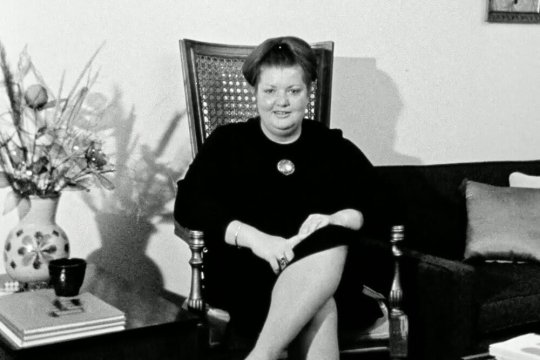
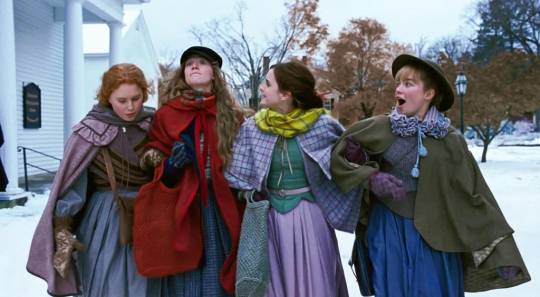

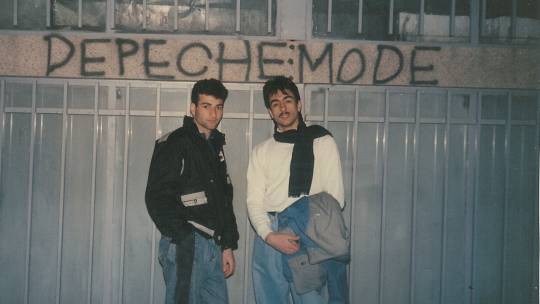
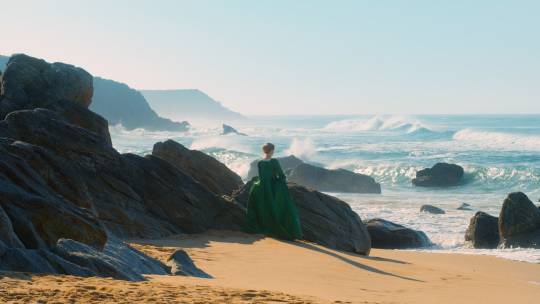
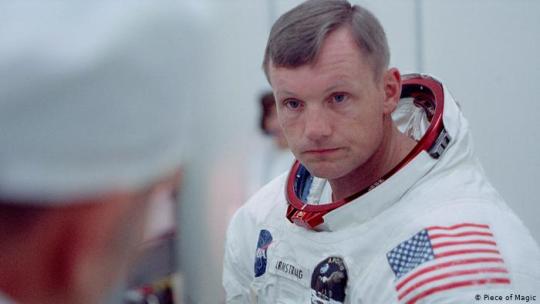
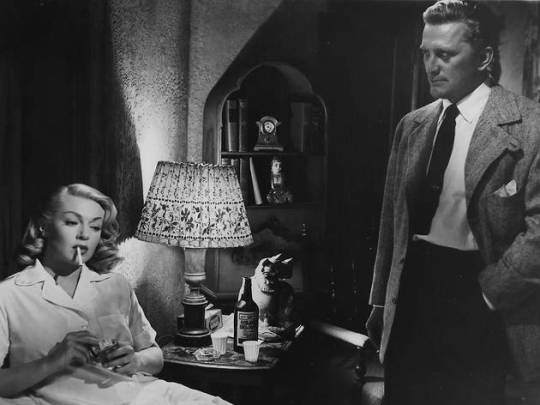



Memorable Viewing from 2020
Betty Tells Her Story (Liane Brandon, 1972)
Little Women (Greta Gerwig, 2019)
City Hall (Frederick Wiseman, 2020)
Our Hobby Is Depeche Mode (Nick Abrahams & Jeremy Deller, 2008)
Portrait of a Lady on Fire (Céline Sciamma, 2019)
Apollo 11 (Todd Douglas Miller, 2019)
The Bad and the Beautiful (Vincente Minnelli, 1952)
Love Is the Message, the Message is Death (Arthur Jafa, 2016)
The Hanging Tree (Delmer Daves, 1959)
In My Room (Mati Diop, 2020)
I didn’t see many movies in this weird year - not by my usual standards, anyway - but I still wanted to record some kind of snapshot of my viewing year. Obviously I didn’t catch much of anything theatrically. I saw Little Women at an MJR with my wife and daughter on January 1st, Uncut Gems a week later, and Varda by Agnès at the Detroit Film Theatre in late January. Just days before things started closing, I passed an hour in the cafe at the Maple Theater, where Portrait of a Lady on Fire was playing, and hoped I’d get back there to see the film before it left (I didn’t).
Also memorable, my siblings and I thoroughly debriefed Bill & Ted Face the Music over a Zoom call, having previously planned to see that together on a trip out west. Then there’s the Parasite Blu-ray that, due to the temporary closure of the public library, sat beside my television for something like four months, long enough that I’d stop noticing it. Movie-adjacent (what’s the difference?), I snuck in episodes of The History of the Seattle Mariners and Last Dance, sometimes in 15-minute chunks when I wouldn’t in the way / taxing the broadband. I loved both. And if I’m recapping 2020 accurately, I can’t overlook the three seasons of Avatar: The Last Airbender that my daughter and I watched (first time) Saturday mornings over roughly six months.
Anyway, we’ve all got such stories this year. These are mine...
#Liane Brandon#Greta Gerwig#Frederick Wiseman#Nick Abrahams#Jeremy Deller#Céline Sciamma#Todd Douglas Miller#Vincente Minnelli#Arthur Jafa#Delmer Daves#Mati Diop#2020#EOY
2 notes
·
View notes
Text
Birds of Prey Early Screenings Available for DC Universe Subscribers
Members of the digital subscription service will be some of the first to witness the latest adventures of Harley Quinn (Margot Robbie) via limited special advanced screenings taking place Tuesday, February 4 and Wednesday, February 5 in over 30 cities across the country.
The series of fan screenings specifically created to provide early access to DC UNIVERSE subscribers will begin in Los Angeles, San Francisco and in New York’s Times Square on February 4. All other DC UNIVERSE screenings will take place on February 5 in cities including Chicago, Washington D.C, Dallas, Atlanta, Philadelphia, Houston, and Boston.
Starting on January 31, DC UNIVERSE members will be personally provided with a link to RSVP to the limited event. Those who are not yet subscribed to DC UNIVERSE still have the opportunity to sign-up to take advantage of this exclusive offer by visiting https://www.dcuniverse.com/.
A full list of participating locations and showtimes are below.
SCREENING TIMES & LOCATIONS:
February 4, 2020
LOS ANGELES | 8:00 PM Pacific Theatres at The Grove189 The Grove Dr, Los Angeles, CA 90036
NEW YORK | 7:00 PM AMC Empire 25234 W. 42nd St. New York, NY 10036
SAN FRANCISCO | 7:00 PM AMC Metreon 16135 4th St., Suite 3000, San Francisco, CA 94103
February 5, 2020
ATLANTA | 7:30 PM Regal Hollywood 243265 Northeast Expressway, Chamblee, GA 30341
AUSTIN | 7:00 PM Gateway Stadium 169700 Stonelake Blvd, Austin, TX 78759
BALTIMORE | 7:00 PM AMC White Marsh8141 Honeygo Blvd, Baltimore, MD 21236
BOSTON | 7:00 PM ArcLight Cinemas Boston60 Causeway St Boston, MA 02114
CHARLOTTE | 7:30 PM Regal Phillips Place Stadium 106911 Phillips Place CT, Charlotte, NC 28210
CHICAGO | 7:00 PM AMC IMAX Navy Pier700 E Grand Ave, Chicago, IL 60611
DALLAS | 7:00 PM AMC NorthPark8687 N Central Expy, Dallas, TX 75231
DENVER | 7:00 PM UA Colorado Center2000 S Colorado Blvd, Denver, CO 80222
DETROIT | 7:00 PM MJR Troy Grand Digital Cinema 16100 E Maple Rd, Troy, MI 48083
HOUSTON | 7:00 PM Greenway Grand Palace3840 Weslayan St, Houston, TX 77027
JACKSONVILLE | 7:30 PM Regal Avenues9525 Phillips Highway Jacksonville, FL 32256
LAS VEGAS | 7:00 PM Regal Red Rock IMAX11011 W Charleston Blvd, Las Vegas, NV 89135
MIAMI | 7:30 PM AMC Aventura19501 Biscayne Ste 3001 Aventura, FL 33180
MINNEAPOLIS | 7:00 PM Showplace ICON1625 West End Blvd
ORANGE COUNTY | 7:30 PM Edwards Metro Pointe901 S Coast Dr Unit 205D, Costa Mesa, CA 92626
ORLANDO | 7:30 PM AMC Altamonte433 E Altamonte Ave. Altamonte Springs, FL 32701
PHILADELPHIA | 7:30 PM Regal UA Riverview Plaza1400 S. Columbus Blvd, Philadelphia, PA 19147
PHOENIX | 7:00 PM Harkins Arizona Mills IMAX5000 South Arizona Mills Circle, Tempe, AZ 85282
PORTLAND | 7:00 PM Regal Lloyd Center1510 NE Multnomah St Portland, OR 97232
SACRAMENTO | 7:00 PM Century Roseville 141555 Eureka Rd, Roseville, CA 95661
SALT LAKE CITY | 7:00 PM Megaplex Jordan Commons9335 State St, Sandy, UT 84070
SAN ANTONIO | 7:00 PM Santikos Silverado 1611505 W FM 1604 N, San Antonio, TX 78250
SAN DIEGO | 7:00 PM AMC Mission Valley1640 Camino Del Rio N, San Diego, CA 92108
SAN JOSE | 7:00 PM AMC Saratoga700 El Paseo de Saratoga, San Jose, CA 95130
SEATTLE | 7:00 PM Pacific Science Center Boeing IMAX200 2nd Ave N, Seattle, WA 98109
TAMPA | 7:30 PM AMC Veterans9302 Anderson Rd. Tampa, FL 33634
WASHINGTON DC | 7:00 PM AMC Mazza5300 Wisconsin Ave NW, Washington, DC 20015
Source: CBR
#dinah lance#dc universe#dc#dc comics#black canary#huntress#helena bertinelli#birds of prey and the fantabulous emancipation of one harley quinn#harley quinzel#harley quinn#cassandra cain#renee montoya
2 notes
·
View notes
Text
Interview with Pulitzer Prize Winning Playwright TONY KUSHNER

Known for his groundbreaking works including the Pulitzer Prize-winning Angels in America and the Olivier-awarded Caroline, Or Change, Tony Kushner has become one of the most prolific playwrights of our generation. I sat down with Mr. Kushner who was in Chicago to receive the Chicago Tribune Literary Prize as part of the Chicago Humanities Festival. MJR:Let’s talk about The Intelligent Homosexual’s Guide to Capitalism and Socialism with a Key to the Scriptures, a new work that you developed at the Guthrie Theatre in Minneapolis this past year. How did the concept come to fruition for you? TK: The way all ideas come about. I had been thinking for a very long time about writing it a play that dealt specifically with LGBT issues and I had also been thinking of dealing with Marxism onstage in the Perestroika era. I’ve always wanted to do something about American Marxism or American Communism specifically so all of that came together when Joe Dowling asked me to do a new play for the celebration that the Guthrie did of my work. They performed Caroline, Or Change and 5 short plays last spring. MJR: Speaking of Caroline, Or Change, the Chicago production mounted by Court Theatre won four Joseph Jefferson Awards including Best Musical was an unequivocal success. Tell us about your partnership with Jeanine Tesori during the development of Caroline. TK: Jeanine is an amazingly talented composer. In my opinion the best composer writing for the theatre living. I am enormously happy and consider myself very fortunate that we hooked up. I never enjoyed working with anyone as much as I enjoyed working with Jeanine. We’re currently working on a new piece together. MJR: Story-wise, Caroline, or Change explored your upbringing in Louisiana. What was the process of transferring a semi-autobiographical narrative to the musical stage? TK: Well of course Caroline is a fictional character. The character is loosely based on the woman who worked as a maid for my family when I was a kid. It was actually dedicated to her. She just turned 80. There are episodes and certain details in the play that are absolutely from my childhood. I grew up in Louisiana. But the piece is not autobiographic in any kind of reliable sense. The character of Caroline is some degree based on but many of the details of her life are different.
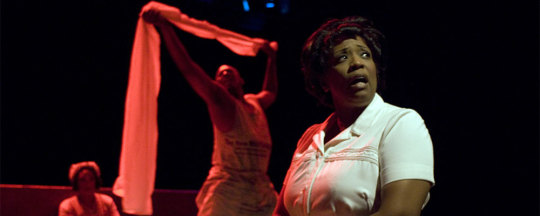
Jeff Award Winner E. Faye Butler in CAROLINE OR CHANGE MJR: As a playwright, what was the most challenging component of musicalizing text to propel a narrative? TK: I wrote the whole thing before I started working with Jeanine so in a way it was like writing a play. It was in a loosely rhymed and metered verse. To some degree it’s like learning a new language because there’s a lot about musical theatre that requires very specific skills that I do not have. I have very little experience working with the form. So I was guided to a great extent by Jeanine and by George Wolfe . But there was a lot that I had to learn about how to construct a moment with music. Caroline is essentially an opera, it’s through-composed. We were both learning a lot while we were doing it. I’m working with Jeanine now on a new piece and I’ve already begun things I didn’t know. In some ways Caroline was easier than most of the plays that I’ve done because it was so much more collaborative. Once I had written a libretto in the first draft I began to work with Jeanine very closely; I wrote the words, she wrote the music with much overlap. We went through every word and every note very thoroughly. I had to learn a very different tempo in terms of how to do re-writes because if you’re doing a musical and you exchange a line, that changes any of the music. And in previews you’re dealing with giant and very cumbersome machinery, and orchestrations. The singers have to learn the music which is a very different process than just learning a new line so it was complicated. MJR: The musical spurred quite a reaction here at Chicago’s Court Theatre. Have audiences received the show differently in varying parts of the country? TK: I actually haven’t seen it in the South yet. It’s been done in a few places including Lake Charles. Everywhere that it’s been done it’s been very successful, people have responded with great enthusiasm. It was a big hit in London, it won the Olivier award. It’s done very well everywhere. Certainly there are times when it’s felt very different. Jeanine and I came out to see it in Chicago right before the election, right down the street from the Obama house. That was certainly a different kind of feeling, kind of an electric and exciting feeling to be let into the Court in the anticipation of the election. Last spring when it was at the Guthrie it was interesting to see the play post-Obama. Obviously the line when Noah says Caroline is the President of the United States meant one thing 45 years ago. Now when there actually is an African American president in the United States it has a slightly different quality. That’s true for most plays today; the surrounding context changes in locale and time, and they become different.

MJR: HBO has been showing Angels in America for the past month. That dramatic sequence was groundbreaking for several communities. How do you think LGBT issues have shaped theatre in the past two decades, and how has theatre informed the community? TK: Well I don’t think my play . I think that one could say that with Larry Kramer’s The Normal Heart. It coincided with relating to the AIDS epidemic for our community. Angels in America came around later. I have no idea what Angels did or didn’t accomplish beyond the fact that it’s a good play. And that’s the most I ever hoped for. The question of the relationship between LGBT politics and theatre is an interesting one. Obviously an enormous number of people who work in theatre are from the sexual minority area and community. I think there’s a reason for that. It’s where we’ve been contributing to theatre in percentages disproportionate to our percentage in the normal population. And I think that on one hand it’s the case that communities of the oppressed very often find a home in the theatre because people who are oppressed learn the difference between what something seems to be and what it actually is; irony, which is an important ingredient in the theatre, the shaking of reality- these are all things that are part of the everyday life of everyone who has a lived experience of oppression. So I think it makes sense that we would be found in greater numbers in the theatre. Theatre is always very quick to respond to moments of social crisis because it doesn’t take any money or particular organization of capital to make a play. You just find a good writer, actors, director, and a theatre willing to do it and you can put together a play about any subject fairly quickly, certainly much more quickly than you can with most instances of film or television. Theatre is always a good quick response. It is also the place that we go to in order to grapple with social issues of real moment. If you allow Angels to be anything other than a good play, it allowed for a moment in the early 90s at the end of the first chapter to provide a public place for mourning the people who had died in the phase of the epidemic. It was also way of celebrating the end of the Reagan era; there was a great deal of release when Clinton beat the first Bush. We thought, however incorrectly, that we had closed the door on the nightmare of Reaganism which was a pernicious ideology that appeared at the same time as the AIDS virus. So I think that the play was about those things, connected to those things, and provided a public opportunity. MJR: You just finished wrapping up a new screenplay on both the life and work of Abraham Lincoln for Steven Spielberg. What provokes your interest in this particular era of our nation’s history? TK: I worked on for the last three years. We’re working on moving it into the next phase. It’s the time period where every tension and every unresolved conflict in American history prior to the Civil War came to a boil, and eventual explosion. Everything that this country is struggling to become emerges from the crucible of the Civil War. I think Abraham Lincoln, in my opinion, is inarguably our greatest president and one of the greatest people that ever lived- just a completely remarkable figure. I am tremendously interested in him and in his era. MJR: Your stage works are inherently both dialogic and dialectic in form. What keeps your interest in film as a narrative medium, especially since it is often one that focuses on the monologic story? TK: I think film is an extraordinary medium. Many great works of art in the 20th century were created by filmmakers. I feel that’s it’s more narrative driven than theatre, it’s certainly more all-encompassing kind of illusion. I think it doesn’t play as much as theatre does with questions of illusion and reality. To a certain extent I feel as though film is a degree more isolating, it’s perhaps less of a communal experience, though certainly the thing that all the audience’s attention is focused on does not respond to what the audience is telling it. It’s the same from one showing to the next. Obviously there are some stories that cannot be told onstage that can be told on film, there’s just a mathematical question of how many individuals can be reached by a film or television show as opposed to theatre. For me there’s a certain pleasure in surrendering the absolute authority; a playwright in the theatre has, if nothing else, the authority that comes from property ownership. I own the play, I rent the play to the producers, directors, and actors to perform, but it’s mine. When people get together to do a play one of the only common grounds they have to stand is the script. In film, it’s much more the director. The playwright doesn’t own his or her own words. It’s interesting to me and in some ways enjoyable to hand that authority over to somebody else and to be one person among a number who is working to create this final product, but not the person who finally has the decisive say in what it’s going to be. I’ve gotten to work with a few artists I admire enormously Steven Spielberg, Mike Nichols…that’s been thrilling. I got to watch both of them make a movie and I’ve learned a lot from doing that. MJR: You’ve noted before your concern of reducing characters, specifically individuals like Lincoln, into dramatic figures. Do you employ a different approach in humanizing characters for the stage as opposed to a screen medium? TK: Hamlet is a dramatic character, but there’s no reduction in Hamlet. I could think of a dozen film characters as rich as any human being could be. Lincoln is a genius on the level of Mozart or Shakespeare and it’s very difficult and possibly impossible for someone who isn’t a genius to come to any kind of understanding of how Lincoln did what he did. I think that it’s probably impossible for us to know those things. To try and create a dramatic device that is going to deliver the secret of Lincoln’s inner genius or the secret of how Mozart wrote the Requiem or how Shakespeare wrote Hamlet is kind of nonsense. You can’t do that. These are leaps of the human imagination that are so vast and so extraordinary, and rare, that they’re really in a certain sense immeasurable and incomprehensible. What we have is the consequence which is somewhat immeasurable and incomprehensible. There is no one who will ever say everything there is to say about Hamlet, it’s infinite as much as any human creation can be called infinite. I don’t feel that there is any necessary for dumbing down or reducing my ambition as a playwright because I am writing a screenplay. I feel that I can write characters that are just as rich onscreen as they are onstage. There are certain requirements that the forms have that are very different; language is different, the way you construct a character for a script that hopefully many different people will use or perform is different than when you’re writing a script for a director for one movie. So you have a sense that what you are doing is much more for a specific moment.
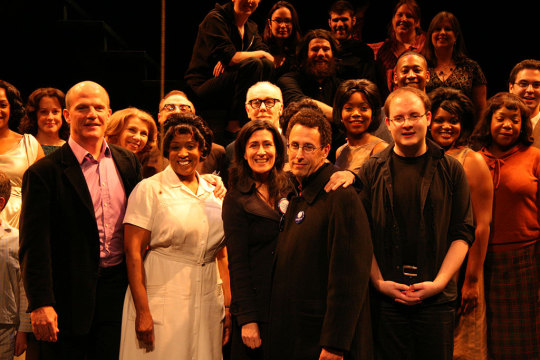
Tony Kushner, Jeanine Tesori at Court Theatre's CAROLINE OR CHANGE. MJR: Tell us about your process of developing a new work for stage production. TK: I don’t feel that I ever get inspired to do anything. Various impulses come at me during the course of a day just as they came at anybody. I read stories or I remember things that I’ve seen that seem of interest to me because I’m a playwright, that’s my job. I take note of those things and I write them down. If something that I’ve seen or been intrigued by sticks around, I’ll start to wonder if there is something in it that might become a play. If I feel clearer and clearer about why it’s interesting to me- whether it be a person, image, or event in history- I’ll start to keep a separate notebook about it and start to think of what could come as the basis of a play. You mull over five or six things at a time and for one reason or another one of them will the surface. MJR: Do you often find yourself become reclusive during this process? TK: I certainly try to . You should. It’s a good idea to do that. It’s always a mistake to not make that kind of time, but it’s one of the hard things about being a playwright. Part of our time is spent in rooms with a lot of people. Isolation is hard for everybody but for some people it’s easier. If you can’t handle isolation you certainly should not be a novelist or a poet. Playwrights I think in general have a tricky balancing act to do between providing material for the excitement and electricity and sexual heat of a rehearsal room-also the fun and terror of being in the theatre with an audience- and being alone in a room. When I’m really deep in the first draft of a play or screenplay I become slightly antisocial. It’s very hard to talk to people, to be out in the world. I think that everybody who writes experiences this to some extent. You have to kind of smooth your skin away and become available to becoming other people, so you lower boundaries and you remove skin and you make yourself slightly less well-organized than you are in everyday life. It’s hard to go out in public that way. I think it’s easier if you can get the play done in the first draft and then resume your public life; otherwise I think you feel sort of unpresentable and you probably are . Read the full article
2 notes
·
View notes
Text
Dream Theater Announce Re-Scheduled Australian Theatre Tour dates
@dreamtheaternet Announce Re-Scheduled Australian Theatre Tour dates #keepyourticket
Twice Grammy-nominated and millions-selling progressive music titans DREAM THEATER are thrilled to be able to announce their re-scheduled dates for the Australian leg of their “Evening With” touring cycle! Dream Theater will be returning in November 2020 to Australian Shores, presented by MJR Presents!
These rescheduled shows are a celebration of the band’s latest record, Distance Over Time, and…
View On WordPress
#Dream Theater#Dream Theater australia#Dream Theater australian tour#Dream Theater news#Dream Theater reschedule tour#Dream Theater tickets
0 notes
Photo

| The Last Jedi | MJR Super EMAX | with AJ | (at Emagine Theatres)
1 note
·
View note
Text
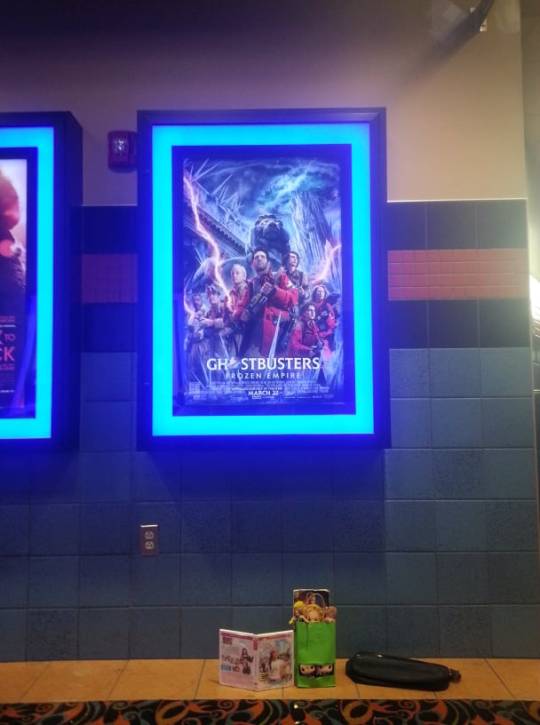

Yes, I was Air Proton Packing!
#the crew#in#mjr theater#mjr theatre#mjr#mjr theatres#to see#ghostbusters: frozen empire#with#Ray#mjr theaters#and#Nick
1 note
·
View note
Photo

Me and my family seen #isleofdogsmovie at this #mjr theatre
0 notes
Text
MoviePass Review: Is it Really Unlimited Movies for One Price?
make certain you visit www.transfs.com webpage for a great deal more tips on finances
MoviePass claims to offer unlimited movie tickets for one low monthly price. Is it too good to be true? We answer that question in our MoviePass review.
According to the National Theater Owner’s Association, the average price of a movie theater ticket was $8.84 as of the first quarter of 2017. If you live in a metropolitan area, you know the real price you’ll pay is more like $12. That kind of pricing keeps a lot of people from going to the movies more often. But there might be a workaround in the form of a smartphone app.
That app is MoviePass. It’s a movie theater subscription service that you access from your smartphone. It is the largest movie theater subscription service available, giving subscribers access to over 4,000 movie theaters and more than 36,000 movie screens. They advertise that the service is available in all major movie theaters (though there’s some doubt about AMC).
What’s more, the subscription is virtually unlimited. You can watch one new 2D movie each day of the month, with no blackout dates.
MoviePass Benefits
MoviePass was founded by CEO Mitch Lowe, of Netflix and Redbox fame. He’s taking the same concept from those companies but applying it to actual movie theaters. MoviePass enables the participant to watch movies at theaters up to 31 times per month–all for a very low monthly fee of $9.95 per month.
The MoviePass card itself is actually a credit card–a MasterCard, to be precise. When you go to the theater, you pay for your ticket using the card just the way you would any other credit card.
With an average movie ticket at $12, you can see up to 31 movies per month–at a total cost of $372–all for a monthly fee of less than $10. That, of course, is extreme, but you could if you wanted to.
But, even if you only go to the movies no more than two or three times per month, at a cost of $24 or $36, you would still save $14 or $26 per month using this app (the actual cost of the movie tickets, less the $9.95 subscription fee you’ll pay to MoviePass).
Signing Up for MoviePass
You can sign up for MoviePass online or with your smartphone. But you must have an iPhone or an Android (with data service) in order to use it.
You will receive your MoviePass card by mail within seven to 10 business days after signing up. Once the card arrives in the mail, you can log into the MoviePass app with your email and a password. The app will request the last four digits of your MoviePass card in a pop-up box. Once you enter that information, your subscription will be fully activated, and your billing date will be set.
The monthly subscription fee is $9.95. The service offers only one person per app. So if you want to add family members, each will have to subscribe to the app individually. Also, memberships are nontransferable. Only you can use your subscription.
You must put a credit card on file, which MoviePass will charge on each monthly billing date.
How MoviePass Works
Once you receive your MoviePass card, you can begin using the app to browse theaters and showtimes. You can only use the app for same-day tickets. You are not able to purchase your tickets in advance.

Your MoviePass card is your payment method when you go to the theater. The card is actually a MasterCard, which is how the theater will be paid. That means you must have the card with you whenever you go to the theater. You can pay and get your ticket at the box office or kiosk.
The app works in five steps:
When you arrive at the theater, browse movies and showtimes on the MoviePass app.
Once you’ve found the movie you want, click the desired showtime. Then, at the bottom of the screen, click “Check-In.”
Upon check-in, your MoviePass will be activated for 30 minutes. Just swipe it at the box office or kiosk to purchase your ticket.
For e-ticketing theaters (see below), once you check-in, your app will generate a confirmation code that you can present at the kiosk or box office to retrieve your ticket.
Enjoy the show!
Canceling check-in. If you change your mind and decide you don’t want to watch a movie, or if it is sold out, you can cancel right on the app. You can press the “Sold Out? Changed Mind?” button on the Check-In page. Once done, you can check into a different movie.
More MoviePass Features
E-ticketing. MoviePass has this function with several theater chains, including Goodrich Quality Theaters, Studio Movie Grill, and MJR Theatres. E-ticketing is a redemption process that enables you to reserve your same-day ticket in the app before arriving at the theater. At theaters that also offer reserved seating, e-ticketing will enable you to select your seat in advance.
Gift Subscriptions. If you want to give the gift of movies, you can purchase a gift subscription through the app. You must pay for gift subscriptions in advance, and they are available on the following terms:
three months at $29.85
six months at $59.70
12 months at $119.40.
Canceling your MoviePass subscription: If after subscribing to the app, you decide that you want to cancel, you can do it easily. On the home screen, click the icon with the three horizontal lines in the upper left-hand corner. From the dropdown menu, select your name. On the “Subscription Information” screen, select “Plan Info”, then click “Cancel Account.” The cancellation will take effect on your next billing date.
MoviePass Partnership with Studio Movie Grill
MoviePass has partnered with Studio Movie Grill in testing and Open Tab feature. It will enable you to pay for your movie ticket as well as your in-theater meal and drinks using the MoviePass app. This is a beta program, so it may or may not be available at your local Studio Movie Grill theater.
Studio Movie Grill is offering its guests a limited one-month trial of MoviePass for $10. It will similarly allow the holder to attend one movie per day in its theaters for an entire month. It must be purchased only at Studio Movie Grill locations.
The MoviePass – Studio Movie Grill partnership is significant because MoviePass is actively working to increase such partnerships with other movie theater chains. Studio Movie Grill, for its part, expects to increase attendance through the partnership.
In Case You’re Wondering How MoviePass Makes Money…
If you’re like me, and you stumble across a winning service, you want to know that the provider is making a profit. After all, if they aren’t, the winning service won’t be around for very long.
On the surface at least, it looks as if there’s no way that MoviePass can ever be profitable. But look a little deeper, and it begins to make sense.
Let’s say that you are a certified movie maven, who actually does go to the movies every day of the month. How can MoviePass make money when you’re paying just $9.95 per month, and they are paying $372 (31 movies X $12 per ticket) to theaters for you to watch 31 movies?
Answer: they’re not. At least not on you.
But according to founder and CEO Mitch Lowe, the “secret” is in the numbers. They know the average person only goes to the movies three to six times per year. They believe that the MoviePass app will increase that to six to 12 times.
At an average frequency of 9 times per year–at $12 per movie ticket–that’s $108 MoviePass has to pay out to theaters. With an annual subscription rate of about $120, MoviePass will earn an average of 10% ($12) on each subscription.
Lowe is also working to create more true movie theater partnerships, such as the one they are currently working on with Studio Movie Grill. The increased frequency of theater visits by MoviePass users generates higher concessions sales, enabling the theaters to increase their profits. MoviePass is working to get a part of those profits through partnerships.
MoviePass Pros
If you go to the movies two or more times in a typical month, MoviePass will be well worth the price of $9.95 per month.
If you’ve been avoiding the movies due to cost, MoviePass will enable you to go more frequently. In fact, cost will no longer be a factor, at least as far as movie tickets.
Ordering movie tickets through your smartphone avoids the need to stand in line waiting to purchase a ticket. This can be a major advantage at peak movie times or for blockbuster movies that draw big crowds.
The widespread acceptance of MoviePass, as well as the partnerships with select theater chains, holds the potential for the expansion of the app going forward. It could revolutionize the movie theater process, and you’d be on the cutting edge if you already have the app.
MoviePass Cons
MoviePass is available for 2D movies only. It is not available for enhanced or special screenings that might involve an up charge by the theater. This includes movies in 3D, IMAX, Fathom Events, DBOX, ETX/RPX, or film festivals.
Unless the theater offers e-ticketing, you have to be at the theater to order your ticket.
Not all theaters or theater chains participate in MoviePass.
Since you must be at the theater (or within 100 yards of it) where the movie you want to see is showing, you won’t know in advance if the movie has been sold out. But that would happen even if you didn’t have MoviePass.
Since a subscription can be used for one person only, you would need to have a subscription for each person in the family. The app would cost $39.80 per month for a family of four.
Should You Sign Up with MoviePass?
MoviePass is definitely worth considering if you are a frequent moviegoer, or you want to become one. It can reduce the cost of going to the movies several times per month to less than the cost of a ticket for a single show.
If you’re not a frequent moviegoer, even apart from the cost factor, MoviePass won’t be much of a benefit. For example, if you typically go to the movies less than once a month, the subscription may cost you more than the benefit that you’re getting.
The fact that you need to purchase a subscription for each member of your family could be cost prohibitive. However, if you have children who are at the age where going to the movies is a favorite pastime, this can enable you to bring them as often as you like. The cost of going to the movies will no longer be a factor.
If you’d like more information, or if you’d like to sign up for the app, check out the MoviePass website.
0 notes
Photo

We took G to see Coco, his first movie in the theatre. When the movie was over we asked him whether or not he liked it. He straight up said *no* and I couldn’t stop laughing. 😂 He did ❤️ the 🍿 though! (at MJR Troy Grand Digital Cinema 16)
0 notes
Text
At the movies to see the release of zootopia :)
0 notes
Text
The unlikely pairing of Devin Townsend and his mind has created some of the most wondrous and imaginative discographies in rock history. The anticipation of seeing these creations performed live was a familiar feeling that was buzzing throughout Sydney’s Enmore Theatre on Monday night, whilst Ziltoids and girls were waiting to see the Devin Townsend Project.
Sydney’s own Sleepmakeswaves had the support slot on the bill, but with their performance it isn’t a surprise these guys absolutely fitted perfectly into this show. As always Sleepmakeswaves played a raw emotive set of their powerful instrumental compositions, including To You They Are The Birds, To Me They Are The Voices of The Forest and hit single from their latest album Madeofbreathonly; Tundra. I am so excited to see where these guys will go in such a progressive music scene. The only way is up for Sleepmakeswaves!
A very short wait for the fans as DTP entered the stage in all their bountiful glory with admiration pouring from the fans, who rejoiced as they played their track, funnily enough called Rejoice. The power, passion and love that this band puts into their music is something that I think many hope to strive for with something, anything in their life.
Song after song Devin had this mesmerising connection with the crowd, making eye contact, singing to people, saying thank you. The whole concert we were encapsulated in a bubble of emotion through the set list comprised from most albums with tracks including Stormbending, Hyperdrive, Where We Belong, Deadhead, March of the Poozers (which included a smoke machine which seemed to entertain Devin quite a bit), and Kingdom, all before the encore. Of course there was also an appearance from the traditional Ziltoid puppet in the crowd, bringing laughs all over the venue.
Devin admitted his voice was not up to scratch because of “all the talking and book reading” he did earlier in the day at Utopia records exclusive signing. But we forgave him, because its Devy, and as he still managed to provide an overly exceptional performance. Guitarist Dave Young was absolutely captivating to watch as his head and luscious beard moved with such smoothness with the music.
“We will be back in 2 minutes okay!?” Devin said to the punters eager to hear more. Not even 30 seconds later Mr Townsend comes back with an acoustic guitar evoking a memorable performance with the crowd singing along to Ih-Ah! Where jokingly his falsetto’s “still worked”. The night ended with a jaw dropping performance of Bastard, and Higher. Seeing Bastard live in a rendition close to the performance at the Royal Albert Hall was a dream come true.
Not everyone might understand the music of DTP, or understand Devin as a person, but if you love music you can at least appreciate what this band does and how this band can make you feel as it is something beyond spectacular. I would recommend to anyone to check out DTP at least once in their lifetime. I don’t think you will regret it. Especially the appreciation and love that they give to their fans, even coming out after the show to thank them, shaking everyone’s hand.
That’s a real musician. That is how you end an amazing show. Hevy Devy still has it.
Check out our snaps below!
Catch DTP on the rest of their tour
Saturday, 20th May 2017 The Triffid, Brisbane Tickets: MJR Presents
Monday, 22nd May 2017 Enmore Theatre, Sydney Tickets: MJR Presents
Tuesday, 23rd May 2017 – NEW SHOW 170 Russell, Melbourne Tickets: MJR Presents
Wednesday, 24th May 2017 – SOLD OUT 170 Russell, Melbourne Tickets: MJR Presents
Friday, 26th May 2017 Capitol, Perth Tickets: MJR Presents
#gallery-0-4 { margin: auto; } #gallery-0-4 .gallery-item { float: left; margin-top: 10px; text-align: center; width: 33%; } #gallery-0-4 img { border: 2px solid #cfcfcf; } #gallery-0-4 .gallery-caption { margin-left: 0; } /* see gallery_shortcode() in wp-includes/media.php */
Live Review: Devin Townsend Project @ Enmore Theatre, Sydney 2017 The unlikely pairing of Devin Townsend and his mind has created some of the most wondrous and imaginative discographies in rock history.
0 notes